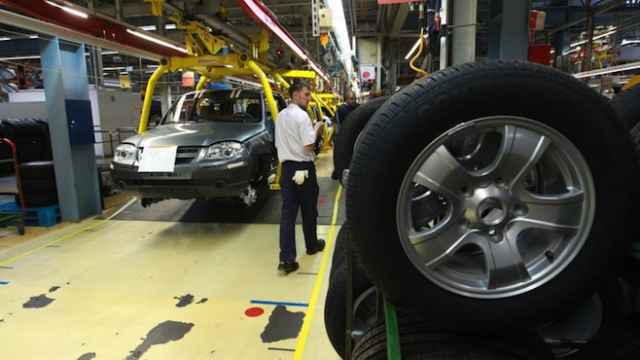Volkswagen AG started production at a newly built engine plant in Russia on Friday, aiming to cement its position in a market which it sees as offering long-term potential despite its recent contraction.
Sited next to Volkswagen's vehicle plant in Russia's car-manufacturing center Kaluga, 150 kilometers south of Moscow, the factory has the capacity to produce 150,000 engines a year. It will make engines for the Polo and Skoda Rapid models that are assembled in Kaluga and will later service the Volkswagen Jetta, Skoda Oktavia and Skoda Yeti models.
"We need to continue and strengthen our partnership [in Russia] despite the current situation," said Volkswagen board member Thomas Schmall. "We are doing everything in our power to strengthen our market position in the long term."
After a decade of annual sales growth in excess of 10 percent, the Russian car industry has been hit hard by an economic crisis caused by lower oil prices and Western sanctions over Moscow's actions in Ukraine.
Domestic car sales have halved from their peaks in 2012-13, when during some months the country ranked ahead of Germany as Europe's largest car market by sales, and eighth biggest in the world. It now ranks only fifth in Europe and 12th globally.
Russia has sought commitments from foreign carmakers to boost local production and wants 60 percent of manufacturing costs spent domestically by 2020. In return, producers enjoy lower import duties on car components.
Volkswagen announced plans in 2012 to spend around 250 million euros on the engine plant, in line with Russian government targets to equip at least 30 percent of vehicles produced in Russia with locally made engines by 2016.
Russian sales of the VW brand fell 44 percent year-on-year in the first seven months of this year and the company in March cut jobs and working hours at the Kaluga factory. But it says its investment plans are intact due to the market's longer-term prospects.
Ford Motor Co's Russian venture, Ford Sollers, also opened a $275 million engine plant in Russia this week. General Motors Co, by contrast, quit the market in March, winding up its Opel brand there and shutting its plant in St. Petersburg.
A Message from The Moscow Times:
Dear readers,
We are facing unprecedented challenges. Russia's Prosecutor General's Office has designated The Moscow Times as an "undesirable" organization, criminalizing our work and putting our staff at risk of prosecution. This follows our earlier unjust labeling as a "foreign agent."
These actions are direct attempts to silence independent journalism in Russia. The authorities claim our work "discredits the decisions of the Russian leadership." We see things differently: we strive to provide accurate, unbiased reporting on Russia.
We, the journalists of The Moscow Times, refuse to be silenced. But to continue our work, we need your help.
Your support, no matter how small, makes a world of difference. If you can, please support us monthly starting from just $2. It's quick to set up, and every contribution makes a significant impact.
By supporting The Moscow Times, you're defending open, independent journalism in the face of repression. Thank you for standing with us.
Remind me later.






